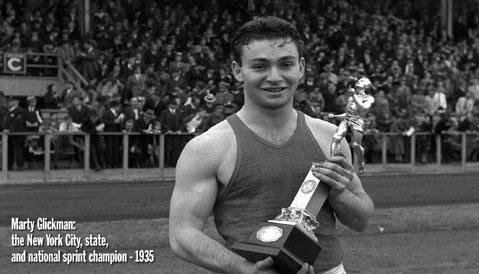Glickman
An Interview with Director James L. Freedman

When an 18-year-old Jew from New York traveled to the 1936 Olympics in Berlin to run the 400-meter relay, nobody yet knew of Hitler’s plans to eradicate European Jewry. There were clues, however. Hitler’s anti-Semitic policies almost led to a U.S. boycott of the games, but U.S. Olympic Committee Chairman Avery Brundage successfully lobbied for participation.
However, Brundage’s sympathies with Nazi Germany kept Marty Glickman and his Jewish teammate, Sam Stoller, from running. On the morning of their race, they were pulled, most speculate, because Brundage did not want to embarrass Hitler by putting Jews on the podium. The film, Glickman, tells the story of how Glickman, despite this seminal disappointment, went on to pioneer modern sports broadcasting, inventing most of the vocabulary with which we describe basketball (“swish,” “elbow,” “lane”), becoming the voice of the football Giants, and helping to found HBO.
Director James L. Freedman recently answered some of my questions via email.
Were you aware of just how much Glickman had accomplished both as an announcer and athlete before starting your research for the film? For instance, it’s hard to fathom that someone invented the term, “swish,” let alone Marty Glickman.
Years ago when I was a senior in high school, I produced Marty Glickman’s radio show on WNEW. At the time all I knew about him was that he was the great sportscaster for the New York Football Giants. I later learned about his Olympic story and how he revolutionized basketball play-by-play. I made the film so others could learn about his incredible life.
Glickman’s ability to paint pictures with words made him a great announcer. But his voice also pigeonholed him as a New York Jew. Can you elaborate a bit on the important roles that voice and language play in your film?
Marty’s ability to paint “words eye” pictures had an even bigger impact in the 1950s and ’60s since television was not as prominent. EPSN and others didn’t exist — so the only way for New Yorkers to experience the game other than being there was to listen to Marty Glickman. Fans who went to the game would often tell their friends what they missed. The friends would reply: “We didn’t miss anything. We saw it on the radio with Marty.”
Larry King summed up Marty’s talents perfectly: “He was television on radio.”
Who is your favorite current sports announcer?
Three of my favorites are Marv Albert, Bob Costas, and Mike Breen — which is why I was so happy when they all graciously agreed to be interviewed for the film.
Glickman is grouped with Jewish/Israel films at SBIFF. Did you set out to create a “Jewish” film?
Not at all. The heart of the film explores what happens when an 18-year-old’s dreams are crushed by racism and prejudice. Do they become bitter? Or do they triumph in life as Marty did? Marty happened to be Jewish — but I feel the story is universal.
The world premiere of Glickman is Sunday, January 29, 5 p.m. at the Metro 4, and it plays again on Friday, February 3, 10 a.m., at the S.B. Museum of Art.



